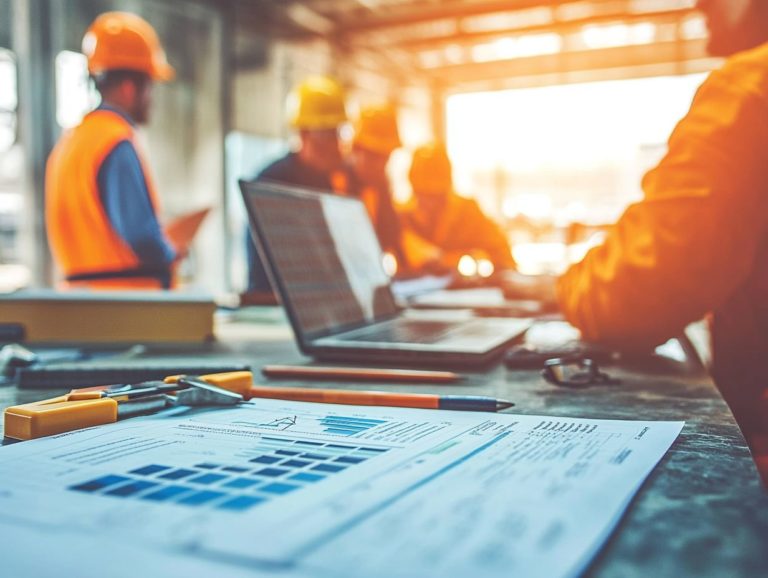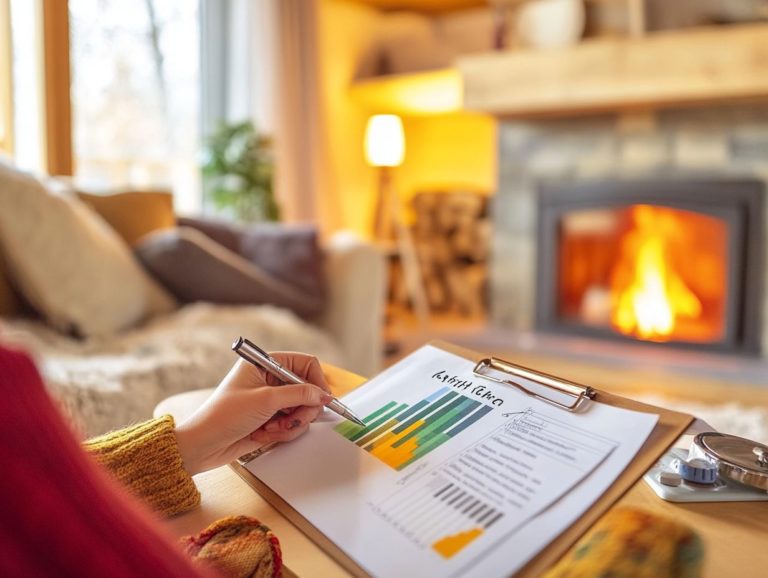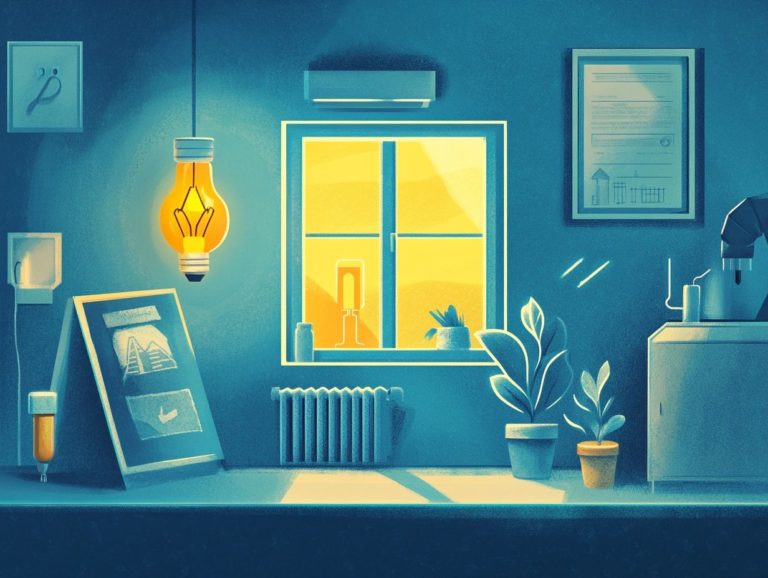Energy Audit Myths Debunked
Energy audits are often shrouded in misunderstanding, giving rise to a range of myths that may prevent homeowners and renters from fully embracing their advantages.
Misconceptions about costs, the types of homes that require audits, and the notion that these assessments are only for those grappling with high utility bills abound. It s time to clear the air.
This article delves into 15 common myths surrounding energy audits, shedding light on their value for everyone, regardless of home type or geographic location.
Join us as we bust these myths and reveal how energy audits can benefit you and the planet!
Contents
- Key Takeaways:
- 1. Energy Audits Are Only for Older Homes
- 2. Energy Audits Are Expensive
- 3. Energy Audits Are Only for Homeowners
- 4. Energy Audits Only Focus on Heating and Cooling Systems
- 5. Energy Audits Are Not Necessary for Energy-Efficient Homes
- 6. Energy Audits Only Benefit the Environment
- 7. Energy Audits Are a One-Time Process
- 8. Energy Audits Are Only for Large Homes
- 9. Energy Audits Are Only for Cold Climates
- 10. Energy Audits Are a Waste of Time
- 11. Energy Audits Are Only for Homeowners with High Utility Bills
- 12. Energy Audits Are Only for Low-Income Families
- 13. Energy Audits Are Not Worth the Investment
- 14. Energy Audits Are Only for Homes with Old Appliances
- 15. Energy Audits Only Focus on Energy Usage
- Frequently Asked Questions
Key Takeaways:
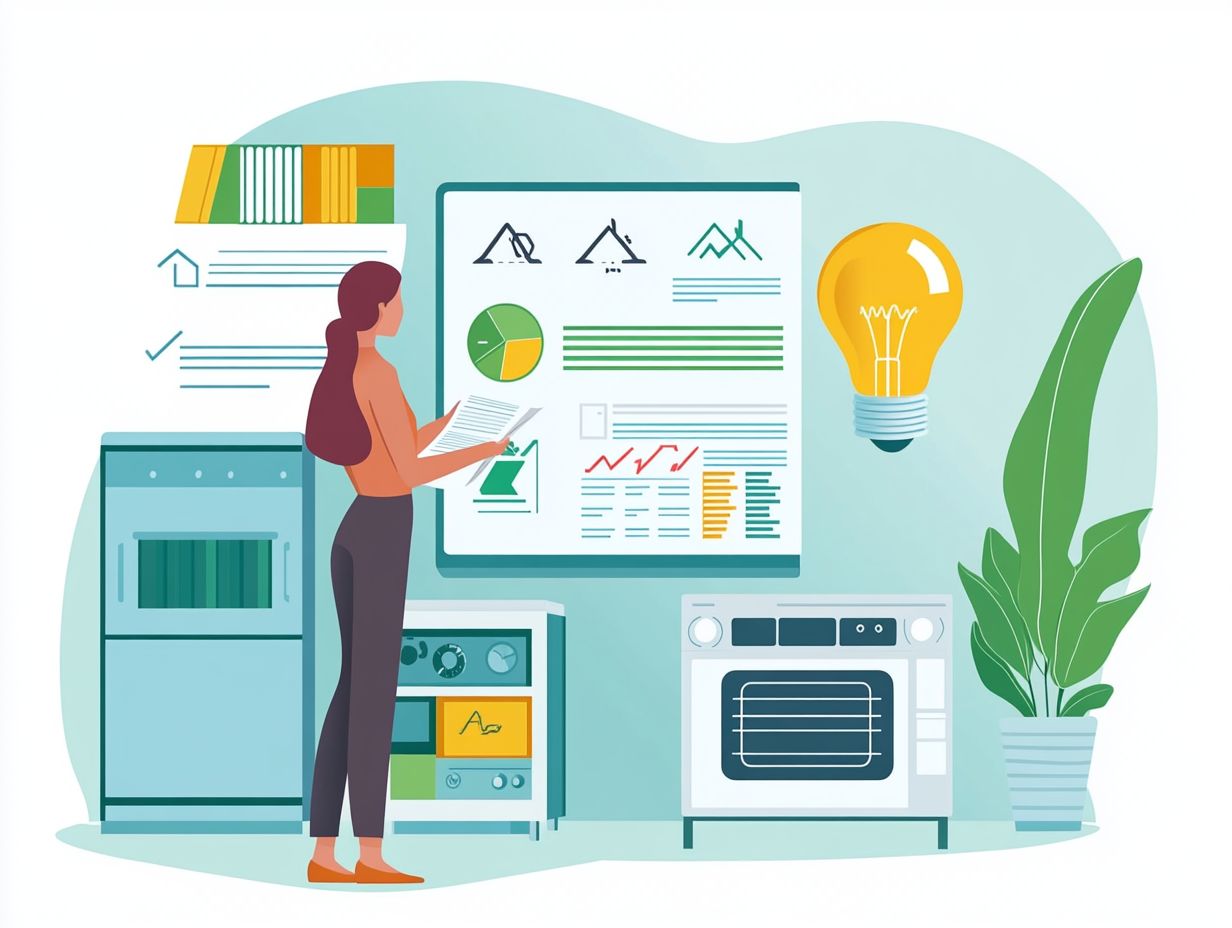
1. Energy audits benefit all homes, not just older ones.
2. Energy audits might seem costly, but they save you money in the long run.
3. Energy audits aren t just for homeowners; renters and businesses can benefit too.
1. Energy Audits Are Only for Older Homes
Energy audits are often misunderstood as being solely beneficial for older homes. The truth is they re essential for any residence, including newly constructed ones.
These evaluations find insulation problems and heating and cooling issues. They also help you live more sustainably by improving energy efficiency.
Use resources from the U.S. Department of Energy to find energy-saving tips. This can help you lower your utility bills, regardless of your home’s age.
Whether you re looking at a freshly built property or a cherished older home, energy audits unveil crucial insights into air leaks and insulation deficiencies that can greatly affect your comfort.
Even newly constructed homes can have overlooked insulation barriers, leaving you to contend with drafts or temperature swings. Incorporating energy-efficient appliances and lighting is key to trimming down energy consumption.
By identifying specific areas for improvement, these audits give you the power to make upgrades that create a more comfortable living space while aligning with long-term savings and environmental sustainability.
2. Energy Audits Are Expensive
While you might view energy audits as an expense, they actually pave the way for substantial long-term savings by offering insights that lead to energy-efficient upgrades.
By pinpointing specific areas where you can cut back on energy consumption, you gain the opportunity to invest in measures that elevate your comfort and enhance overall efficiency.
For example, upgrading to energy-efficient appliances that use less power is a savvy decision. The initial cost of such upgrades might seem intimidating, yet the subsequent drop in your utility bills can create a cascade of savings over time.
With the low-cost, high-impact strategies recommended during audits, the potential return on your investment becomes increasingly clear, illustrating how a well-planned energy strategy can truly pay off.
3. Energy Audits Are Only for Homeowners
A common misconception is that energy audits are exclusively for homeowners. The truth is they can be equally advantageous for renters and property managers aiming to boost energy efficiency.
As a renter, engaging in an energy audit can reveal that even minor adjustments whether it s tweaking your own habits or advocating for improvements from your landlord can lead to significant energy savings.
This collaborative effort gives you the power to push for enhancements like better insulation or modern appliances, which can greatly elevate your comfort in your living space.
If you re a property manager, pursuing these audits can yield invaluable insights that help reduce energy costs while also attracting environmentally-conscious tenants.
It s a win-win situation that benefits everyone involved. Ultimately, embracing energy efficiency fosters a more sustainable living environment, enhancing both property value and tenant satisfaction.
4. Energy Audits Only Focus on Heating and Cooling Systems
Energy audits offer a comprehensive look beyond just HVAC assessments; they dive into various elements like insulation challenges, air leaks, and the performance of energy-efficient appliances.
By carefully analyzing aspects such as lighting design, window placement, and ventilation strategies, these evaluations give you a complete picture of your home s energy consumption.
They highlight inefficiencies that might otherwise slip under your radar and give you the power to make informed decisions.
This holistic approach not only uncovers immediate savings but also helps you save energy in the long run, ensuring that every nook of your home plays a role in reducing energy usage.
Through these audits, the broader vision of energy efficiency becomes much clearer, allowing you to adopt practices that are beneficial for both your budget and the environment.
5. Energy Audits Are Not Necessary for Energy-Efficient Homes
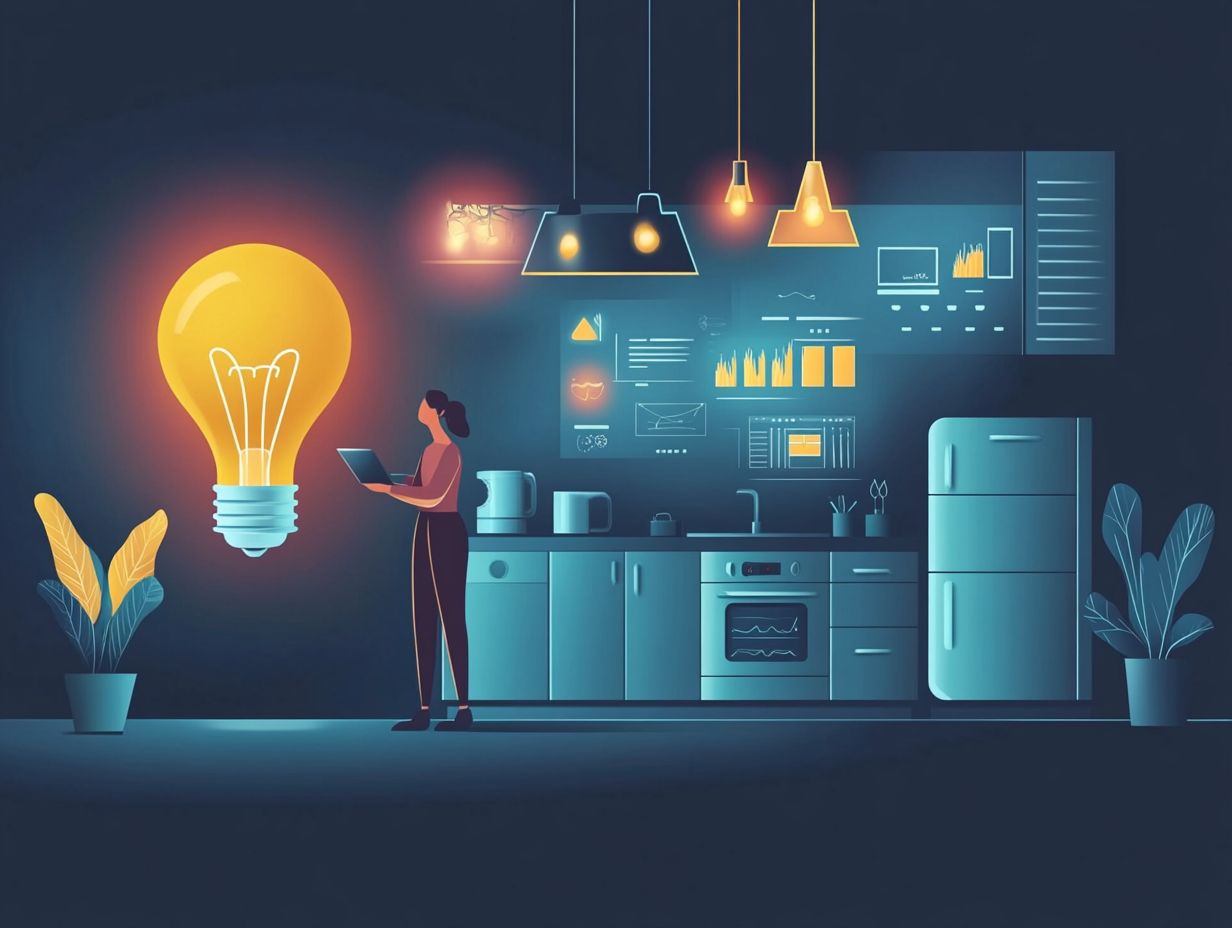
Even energy-efficient homes can greatly benefit from regular energy audits. These assessments help you identify overlooked insulation issues and optimize your existing HVAC systems for peak performance.
You may find that these evaluations provide a comprehensive look at how your energy is being utilized, revealing surprising areas that could use a little enhancement. It’s quite eye-opening to discover minor inefficiencies that, once addressed, can lead to significant cost savings.
These audits also show chances for integrating new energy-saving gadgets, ensuring your home remains at its most efficient.
By continuously monitoring and refining your energy practices, even if you ve already made significant improvements, you can achieve even greater sustainability and progressively lower utility costs over time.
6. Energy Audits Only Benefit the Environment
Energy audits are not just a nod to environmental sustainability; they also unlock significant financial benefits for you, such as lower utility bills and improved comfort in your home.
By pinpointing where energy is being wasted, these assessments give you the power to make smart choices regarding insulation, heating, and cooling systems. This effort not only reduces your household’s carbon footprint but also leads to considerable savings over time.
When you embrace these sustainable practices, you re not just helping the planet you re also enhancing your living conditions. This benefit promotes smart resource use while cultivating a lifestyle that is both ecologically conscious and economically savvy.
7. Energy Audits Are a One-Time Process
Energy audits are often misunderstood as a one-off task, but they should actually be woven into your ongoing strategy for maintaining and enhancing energy efficiency.
By conducting regular evaluations, you not only uncover areas where energy is being squandered but also position yourself to embrace new technologies that can elevate performance.
For instance, using special cameras that show where heat is escaping provides a comprehensive insight into heat loss, highlighting insulation problems that might otherwise escape your notice. Likewise, tests that measure how much air is leaking from your home are invaluable in pinpointing leaks that could sabotage your property s energy savings.
By leveraging these advanced tools, you’re given the power to make informed decisions about necessary improvements, ultimately leading to significant cost savings and a positive impact on environmental sustainability.
8. Energy Audits Are Only for Large Homes
A common misconception is that energy audits are only important for large homes, but even smaller residences can reap significant benefits in comfort and energy savings from these evaluations.
In fact, small homes often possess unique characteristics that can easily be overlooked, making the insights gained from an energy audit particularly valuable.
By identifying issues such as drafty windows, inadequate insulation, or inefficient heating systems, these assessments give you the power to make informed decisions.
Optimizing energy usage in smaller spaces not only boosts comfort but also results in lower utility bills, contributing to a more eco-friendly living environment.
By embracing these recommendations, you can elevate your cozy home into a model of efficiency, demonstrating that even limited square footage can yield substantial improvements.
9. Energy Audits Are Only for Cold Climates
Energy audits are not just for those chilly climates; they re essential no matter where you are. They optimize energy efficiency regardless of temperature fluctuations.
By meticulously examining heating, ventilation, and air conditioning systems and insulation, energy audits offer valuable insights. These can lead to significant cost savings and improved comfort for your home or business.
In warmer climates, these audits highlight areas where your cooling systems can be fine-tuned. This ensures that energy is utilized more effectively to beat the heat.
On the flip side, in colder regions, they help identify inefficiencies in heating systems and areas where insulation might be lacking. This allows you to retain warmth more effectively.
Ultimately, the need for energy efficiency knows no geographical bounds, making energy audits a critical tool for any property owner eager to reduce their environmental footprint and utility expenses.
10. Energy Audits Are a Waste of Time

The notion that energy audits are a waste of time is fundamentally flawed. In reality, these assessments offer invaluable insights that can significantly enhance energy efficiency.
They can lead to substantial long-term savings on utility bills. As a homeowner, you might discover that these audits not only elevate the comfort of your living space but also unveil opportunities for considerable energy savings that could easily slip under your radar.
By pinpointing areas of air leakage, outdated appliances, and inefficient insulation, energy audits empower you to make informed decisions regarding upgrades and improvements.
In the end, the time you invest in an energy audit pays dividends. This results in lower energy costs and a more enjoyable living environment. This proactive approach benefits your wallet and contributes to a healthier planet.
11. Energy Audits Are Only for Homeowners with High Utility Bills
Energy audits are invaluable for every homeowner, not just those grappling with soaring utility bills. They offer essential insights that foster sustainable living and elevate your comfort levels.
By evaluating your home’s energy performance, these audits reveal inefficiencies and highlight specific areas that need attention. This process often uncovers cost-effective solutions that may have slipped under the radar.
You can leverage the insights gained from the audit to make informed decisions about upgrades or maintenance. Ultimately, this cultivates a more efficient living environment.
Not only does this lead to reduced energy consumption, but it also translates into significant savings on your utility bills. This makes it a wise investment for everyone.
12. Energy Audits Are Only for Low-Income Families
The idea that energy audits are solely beneficial for low-income families misses the mark. They hold immense value for everyone seeking to boost energy efficiency and adopt energy-saving strategies.
Conducting an energy audit can reveal wasteful habits and outdated appliances that strain any household’s monthly budget. Homeowners from diverse backgrounds can discover practical adjustments that yield significant savings over time.
Embracing energy-efficient practices helps lower your utility bills and aligns with broader sustainability efforts that benefit the environment as a whole. Start taking proactive steps toward energy conservation today!
13. Energy Audits Are Not Worth the Investment
Many may think energy audits aren t worth the investment, but the significant long-term savings and enhanced comfort they offer truly make them a wise financial choice.
Homeowners who have embraced energy audits often share stories of remarkable reductions in their utility bills. Some even cut costs by as much as 30%.
Take, for instance, a recent case study from a family in Seattle. They made a modest investment in an energy audit, which revealed insulation issues and outdated HVAC systems, ultimately saving them over $2,000 annually.
In a similar vein, a homeowner in Denver experienced improved temperature regulation and reduced energy consumption after implementing the recommendations from their audit.
These real-world examples serve as a testament that while the initial cost may appear intimidating, the long-term financial rewards can overwhelmingly surpass that first expenditure.
14. Energy Audits Are Only for Homes with Old Appliances
Energy audits are crucial not just for homes with outdated appliances. They are also beneficial for modern residences aiming to maximize energy efficiency and reduce waste.
Through these assessments, you gain invaluable insights into how effectively your appliances are functioning. This helps pinpoint any inefficiencies that could be draining your wallet.
By evaluating the energy consumption patterns of older equipment alongside the performance of newer models, you can make informed decisions about upgrades or replacements.
This proactive approach not only bolsters sustainability efforts but also results in substantial cost savings over time. It allows your household to operate more efficiently while contributing to a greener environment.
15. Energy Audits Only Focus on Energy Usage

An energy audit goes beyond merely assessing your energy usage; it includes various factors such as insulation issues, heating and cooling systems, and the overall comfort of your living spaces.
This thorough evaluation examines numerous elements, including the quality of your windows, air leaks, and even the efficiency of your appliances. It paints a complete picture of your energy efficiency.
By addressing these interconnected components, energy audits unveil opportunities for significant improvements. These improvements elevate your comfort levels while cutting down on utility bills.
They also identify upgrades that foster sustainability and can substantially enhance your property’s value.
Therefore, an energy audit is an invaluable tool for homeowners and businesses alike. It steers you toward smarter and more responsible energy management strategies.
Frequently Asked Questions
What is an energy audit?
An energy audit is your ticket to understanding how your home uses energy! It involves a comprehensive evaluation of a building’s energy usage, including heating, cooling, lighting, and other appliances. This assessment identifies areas of energy inefficiency and provides recommendations for improving energy efficiency.
Why should I get an energy audit?
You ll be surprised! An energy audit can help you save money on your energy bills by identifying areas where you can reduce energy usage. It can also improve the comfort and overall efficiency of your home or building.
Are energy audits expensive?
Contrary to popular belief, energy audits are often low-cost or even free! Many utility companies offer free or discounted energy audits to their customers. Additionally, the money saved from implementing energy-saving measures typically covers the audit’s cost within a few years.
Do I need to hire a professional for an energy audit?
While it is possible to conduct a DIY energy audit, hiring a professional energy auditor is highly recommended. They have specialized equipment and knowledge to thoroughly assess your home or building. This helps provide accurate and detailed recommendations for improving energy efficiency.
Will an energy audit disrupt my daily routine?
No, an energy audit typically does not disrupt your daily routine. The auditor may need to access certain areas of your home or building, such as the attic or basement, but they will work to minimize any inconvenience.
Is it worth getting an energy audit if I have a new or energy-efficient home?
Yes, even new or energy-efficient homes can benefit from an energy audit! There may still be areas where energy is being wasted or inefficiently used, and an energy audit can help identify and address these issues.
Ready to boost your energy efficiency? Schedule your audit today!


